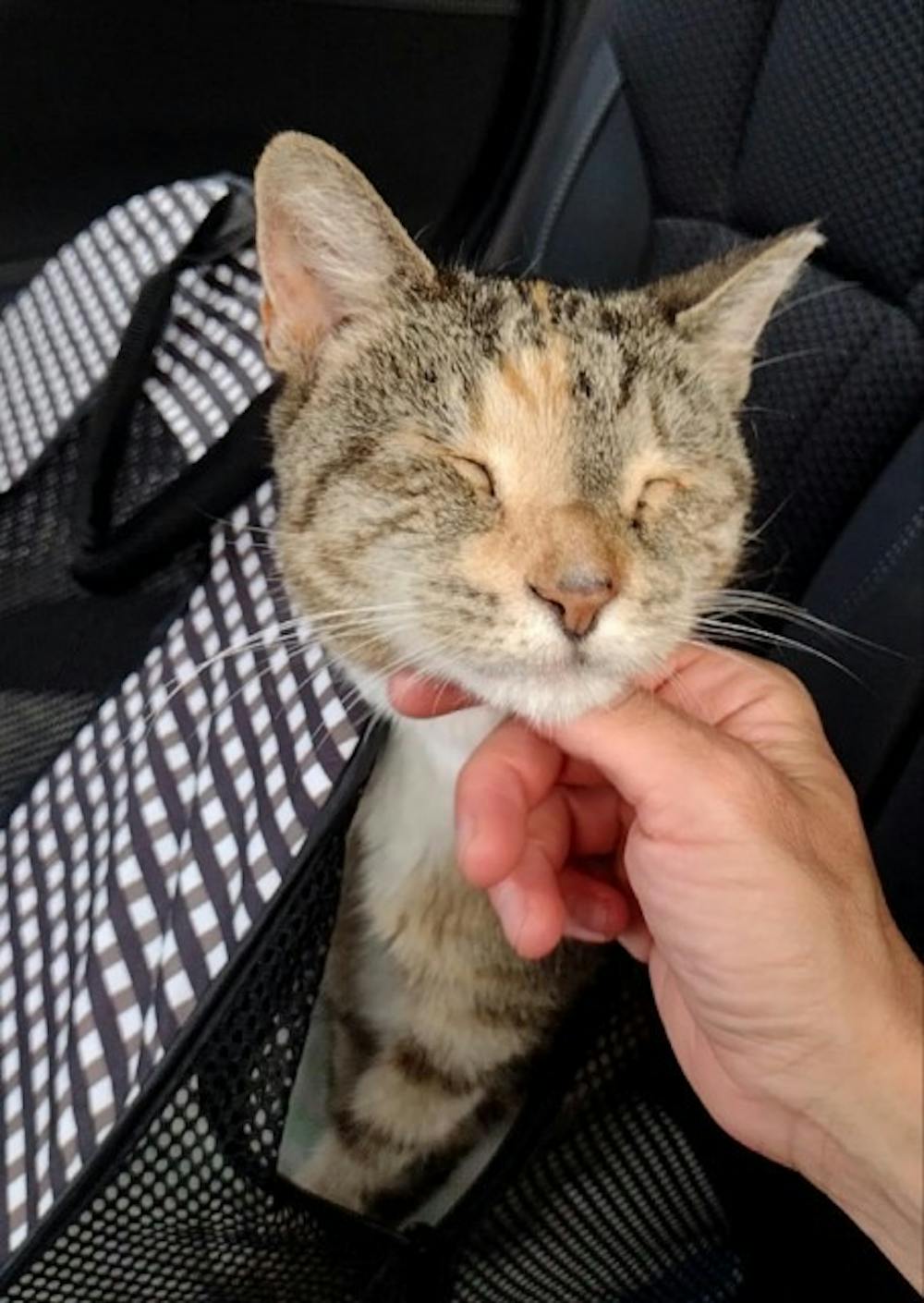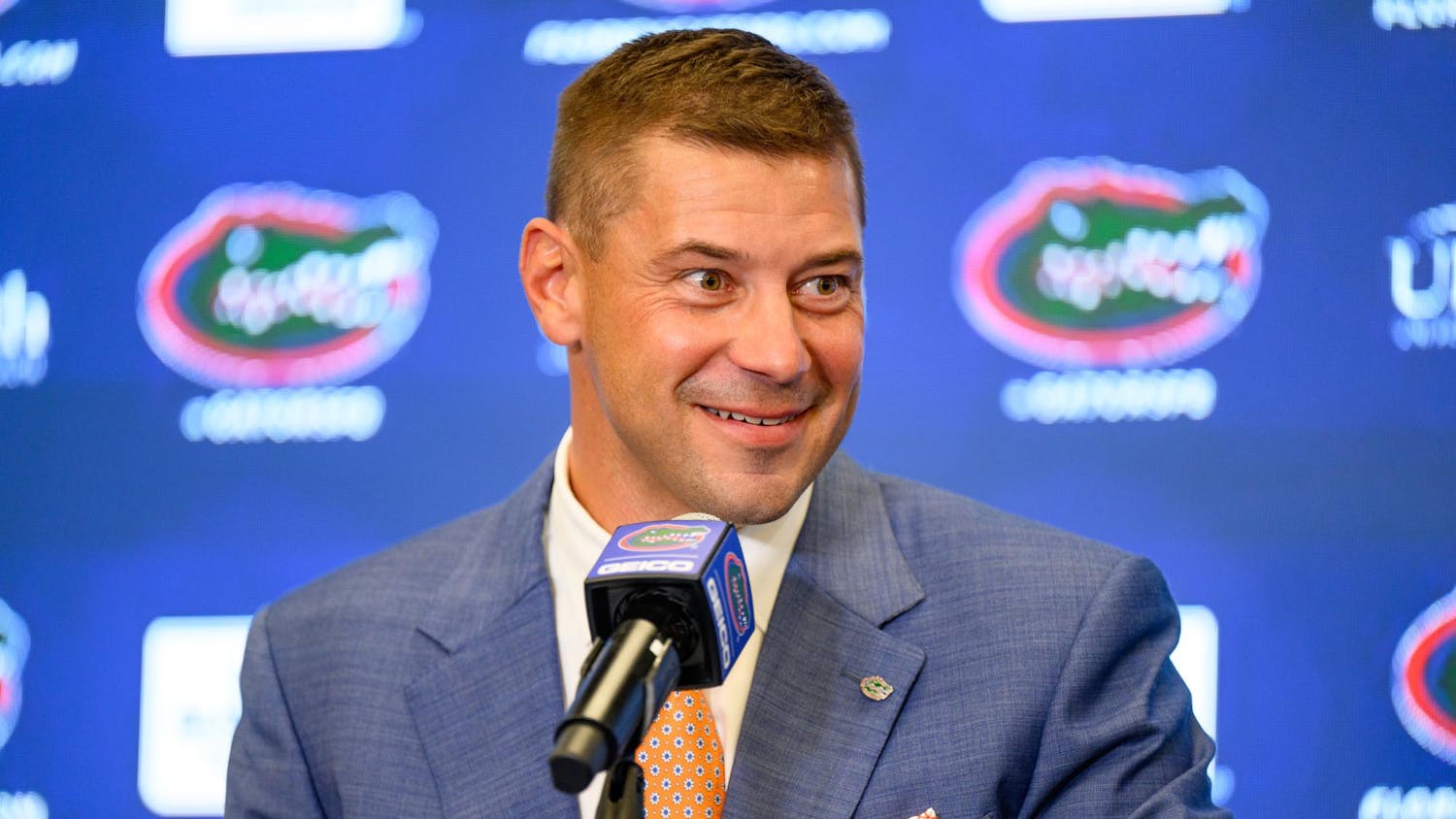A once bereaved community can now rest assured their beloved brown-and-white striped emotional support provider is in good health following her nine-day disappearance from the public eye.
Precious, an elderly community cat who resided in UF’s College of Public Health and Health Professions since 2009, was officially returned and reunited with her primary caregiver July 11.
The UF Police Department provided a public update via Facebook thanking everyone for spreading the word of Precious’ unknown whereabouts.
“Precious is back home thanks to everyone spreading the word,” the update read.
The 16-year-old cat was initially reported missing the evening of July 2, when two UF students recounted witnessing a couple driving off with the cat in the passenger seat of a black pick-up truck.
A UFPD police report was later issued July 5, though no criminal charges have been filed since.
Community efforts to bring Precious home took form in detailed flyers and an extensive social media campaign. Due to a kidney disease, Precious requires a prescription diet provided to her by her primary caregiver.
Precious was once a feral cat roaming the construction yards of the UF Biomedical Sciences Building brought before Operation Catnip in 2009. The nonprofit organization offers free spaying, neutering and vaccinations for unowned free-roaming community cats within Alachua County.
The term, “feral,” as outlined within Alachua County’s municipal code, refers to “a wild animal that exists in an untamed state or that has returned to an untamed state generally not socialized to human contact and is no longer considered domesticated.”
Animal rights groups, such as Alley Cat Rescue, strongly encourage those feeding feral cats to remain up-to-date on the laws in their area, as some municipalities may issue regulations that prohibit and penalize caring for feral cats.
Alachua County recognized the practice of ear-tipping, a distinctive mark which is visible on a cat’s left ear, which designates a community cat as being in a Trap-Neuter-Return (TNR) program.
Since the 1990s, TNR programs have offered a humane approach that spays or neuters feral cats and returns them to their colonies, reduces populations, lowers birth rates and decreases the number of cats admitted to animal shelters for euthanasia. This policy has undergone several efficacy evaluations by researchers since.
For instance, a UF study found that over two years, overall cat shelter intake in a targeted Alachua County zip code decreased by 66%, compared to a 12% decrease in the rest of the county. The researchers attributed this to fewer kitten births due to neutering, reduced nuisance behavior and alternatives to impoundment.
Ines Aviles-Spadoni is a UF research coordinator and community cat TNR advocate who runs @Campuskittiesfl on Instagram. Her advocacy is aimed toward reduction in the population of community cats through various TNR programs.
“We consider this a service to the community. Nobody's paying us to do this, this is a service to the community to reduce suffering,” she said.
Spadoni hopes that through Precious’s return, people will begin capturing feral cats and placing them before Operation Catnip and various TNR programs.
“I really hope that people will go out and volunteer with Operation Catnip to help reduce the population of cats,” she said.
Precious’ impact on the UF health community spans from the past to the present.
Sven Normann, a retired faculty member of UF’s College of Pharmacy who has been with the college since 2005, reminisced upon Precious’ presence during his time spent on campus.
Normann described how public reaction to Precious’s initial disappearance was “wide ranging from students that had been there 10 or 15 years ago, to current folks that enjoyed petting her or giving her a little treat.”
"If you've ever seen her, if you have more than one picture, she's very unique and very mild-mannered,” Normann said. “There are some other cats there that like to fight a little or play rough, and they don't necessarily all get along with each other, but she was always the peacekeeper."
Jasmina Kovacevic, a 27-year-old UF fourth-year medical student, describes Precious as "a very sweet and curious cat”, after meeting her the first month she started medical school.
“She always is curious about her environment and the people that approach her,” Kovacevic said. “There have been times where I was studying at the library and needed a quick break. I might go and sit out at the benches where Precious was, and it really does provide stress relief.”
After UFPD’s Facebook update, Kovacevic wasn’t surprised to see former UF medical students posting pictures of themselves with Precious after receiving their medical degrees.
“Initially, when she had gone missing, people were concerned. They weren't sure where she could have disappeared to, but when we found out that she was found, we were all just very relieved.”
Contact Carlos Alemany at calemany@alligator.org. Follow him on X @close_alemany.
Carlos Alemany is a fourth year political science student and the Alligator's 2024 Criminal Justice Reporter. In his free time, you you may catch him thrifting or sketching in Gainesville.






